I love to read. By God’s grace I am a pretty fast reader; I usually read a couple books each week. I find it helpful to summarize my thoughts on each book and I offer those thoughts in the hope that you will be encouraged to either read or pass over the given title.
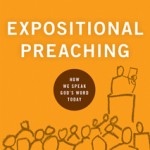 Expositional Preaching: How We Speak God’s Word Today by David Helm. Chandler says this book is “the most helpful, concise, and useful book on expository preaching I have ever read.” Dever says if he could only assign one book for a preaching class this might be the one. Does the book live up to its hype? I would say so. I found the first chapter on “Contextualization” abundantly useful, especially when Helm talks about how “blind adherence to contextualization alters our preaching” (17). The alterations of impressionistic preaching, inebriated preaching, and “inspired” preaching are helpful categories to fight against. A great entry in this great series from 9Marks.
Expositional Preaching: How We Speak God’s Word Today by David Helm. Chandler says this book is “the most helpful, concise, and useful book on expository preaching I have ever read.” Dever says if he could only assign one book for a preaching class this might be the one. Does the book live up to its hype? I would say so. I found the first chapter on “Contextualization” abundantly useful, especially when Helm talks about how “blind adherence to contextualization alters our preaching” (17). The alterations of impressionistic preaching, inebriated preaching, and “inspired” preaching are helpful categories to fight against. A great entry in this great series from 9Marks.
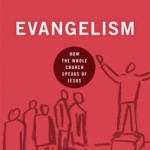 Evangelism: How the Whole Church Speaks of Jesus by Mack Stiles. Stiles is, by all accounts, a profoundly gifted evangelist. His previous book Marks of the Messenger stood as my favorite on evangelism, but this latest offering takes its place. The value of the book is found not only in the excellent encouragements offered for personal evangelism, but also in its focus on a culture of corporate evangelism. He says, “If you are part of a healthy church that has a culture of evangelism, you are a part of the greatest way of evangelism ever known.” Amen! If I had could only give one book on evangelism to church members, this would be it.
Evangelism: How the Whole Church Speaks of Jesus by Mack Stiles. Stiles is, by all accounts, a profoundly gifted evangelist. His previous book Marks of the Messenger stood as my favorite on evangelism, but this latest offering takes its place. The value of the book is found not only in the excellent encouragements offered for personal evangelism, but also in its focus on a culture of corporate evangelism. He says, “If you are part of a healthy church that has a culture of evangelism, you are a part of the greatest way of evangelism ever known.” Amen! If I had could only give one book on evangelism to church members, this would be it.
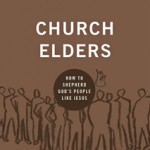 Elders: How to Shepherd God’s People Like Jesus by Jeramie Rinne. In light of the two books above you might expect me to say that Rinne’s contribution to the “Building Healthy Churches” series is my new favorite on the topic of elders. It’s not, but it sure is close. In many ways I feel that he has ably condensed Anyabwile’s Finding Faithful Elders and Deacons and Witmer’s The Shepherd Leader into one accessible volume. The book is full of sound exegesis and sane application, and pokes devastating holes in the “Elders as Board of Directors” approach. I’d encourage any church member to read this book, it would help them get a better understanding of and appreciation for the biblical model of shepherding.
Elders: How to Shepherd God’s People Like Jesus by Jeramie Rinne. In light of the two books above you might expect me to say that Rinne’s contribution to the “Building Healthy Churches” series is my new favorite on the topic of elders. It’s not, but it sure is close. In many ways I feel that he has ably condensed Anyabwile’s Finding Faithful Elders and Deacons and Witmer’s The Shepherd Leader into one accessible volume. The book is full of sound exegesis and sane application, and pokes devastating holes in the “Elders as Board of Directors” approach. I’d encourage any church member to read this book, it would help them get a better understanding of and appreciation for the biblical model of shepherding.
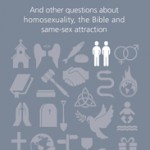 Is God Anti-Gay? by Sam Allberry. Few issues are as timely for Christians to get their minds around as what the Bible says about homosexuality. Is God Anti-Gay? comes from The Good Book Company’s little series “Questions Christians Ask” and Allberry’s contribution ought to be read by all Christians. The author struggles with same-sex attraction (SSA), and thus he is able to combine sharp biblical insight with a unique personal perspective . The book tackles questions like “Aren’t we just picking and choosing which Old Testament laws apply?” to “Can’t Christians just agree to differ on this?” to “What should I do if a Christian comes out to me?” Allberry has done the church an incredible service with this book. Get many copies for your church.
Is God Anti-Gay? by Sam Allberry. Few issues are as timely for Christians to get their minds around as what the Bible says about homosexuality. Is God Anti-Gay? comes from The Good Book Company’s little series “Questions Christians Ask” and Allberry’s contribution ought to be read by all Christians. The author struggles with same-sex attraction (SSA), and thus he is able to combine sharp biblical insight with a unique personal perspective . The book tackles questions like “Aren’t we just picking and choosing which Old Testament laws apply?” to “Can’t Christians just agree to differ on this?” to “What should I do if a Christian comes out to me?” Allberry has done the church an incredible service with this book. Get many copies for your church.
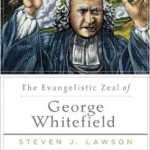 The Evangelistic Zeal of George Whitefield by Steve Lawson. Reformation’s Trust “Long Line of Godly Men” profiles have all been excellent, but Lawson’s entries (Edwards, Calvin, Luther, Spurgeon) have been my favorites. And the admiration only continues with his work on Whitefield. I found my heart stirred afresh for holiness, the gospel, preaching, and evangelism. What a gift to God’s church Whitefield was! “Often as I have read his life”, said Spurgeon,”I am conscious of distinct quickening whenever I turn to it. He lived. Other men seemed to be only half-alive; but Whitefield was all life, fire, wing , force.My own model, if I may have such a thing in due subordination to my Lord, is George Whitefield; but with unequal footsteps must I follow in his glorious track.” This book will help you understand why the Prince makes no overstatement with that sentiment.
The Evangelistic Zeal of George Whitefield by Steve Lawson. Reformation’s Trust “Long Line of Godly Men” profiles have all been excellent, but Lawson’s entries (Edwards, Calvin, Luther, Spurgeon) have been my favorites. And the admiration only continues with his work on Whitefield. I found my heart stirred afresh for holiness, the gospel, preaching, and evangelism. What a gift to God’s church Whitefield was! “Often as I have read his life”, said Spurgeon,”I am conscious of distinct quickening whenever I turn to it. He lived. Other men seemed to be only half-alive; but Whitefield was all life, fire, wing , force.My own model, if I may have such a thing in due subordination to my Lord, is George Whitefield; but with unequal footsteps must I follow in his glorious track.” This book will help you understand why the Prince makes no overstatement with that sentiment.
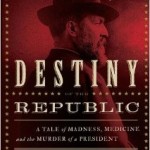 Destiny of the Republic: A Tale of Madness, Medicine, and the Murder of a President by Candice Millard. Not since Unbroken has a work of narrative fiction caused me to miss sleep like this one. Millard masterfully weaves together the tales of President James Garfield, his assassin Charles Guiteau, and legendary inventor Alexander Graham Bell into a narrative that is equal parts gripping and informative. Millard is not yet on the level of Hillenbrand, but give her some more time and she’ll be there. I am told she is currently writing on Winston Churchill, a publication I look forward to with high expectation.
Destiny of the Republic: A Tale of Madness, Medicine, and the Murder of a President by Candice Millard. Not since Unbroken has a work of narrative fiction caused me to miss sleep like this one. Millard masterfully weaves together the tales of President James Garfield, his assassin Charles Guiteau, and legendary inventor Alexander Graham Bell into a narrative that is equal parts gripping and informative. Millard is not yet on the level of Hillenbrand, but give her some more time and she’ll be there. I am told she is currently writing on Winston Churchill, a publication I look forward to with high expectation.
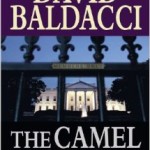 The Camel Club by David Baldacci. The Camel Club, group of misfits who love conspiracy theories, stumbles upon a murder that has the predictable “astounding, far-reaching implications” threatening the very fabric of our national security. I am a sucker for such unrealistic predictability so I dove in despite my fear the outcome would be somewhat cheesy. The plot is interesting, in spite of being bloated by too many characters. I am not sure the conclusion actually crossed the border into the realm of “cheese”, but it nonetheless demands more faith from the reader than I can give. And so it is that my month-long Baldacci binge comes to its conclusion.
The Camel Club by David Baldacci. The Camel Club, group of misfits who love conspiracy theories, stumbles upon a murder that has the predictable “astounding, far-reaching implications” threatening the very fabric of our national security. I am a sucker for such unrealistic predictability so I dove in despite my fear the outcome would be somewhat cheesy. The plot is interesting, in spite of being bloated by too many characters. I am not sure the conclusion actually crossed the border into the realm of “cheese”, but it nonetheless demands more faith from the reader than I can give. And so it is that my month-long Baldacci binge comes to its conclusion.
